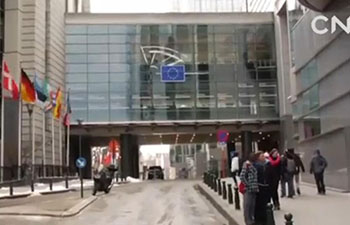BEIJING, June 19 (Xinhua) -- The United States' newly imposed controversial tariffs on imports from countries and regions including China and Europe have sounded the alarm to global observers.
Though Washington claims that the extra tariffs were allegedly meant to safeguard its "national security," international experts believe the U.S. protectionist move is merely undermining the global trade order and development.
On Friday, the United States announced additional tariffs of 25 percent on Chinese imports worth approximately 50 billion U.S. dollars. In response to that, China decided to impose additional duties of 25 percent on U.S. products worth about the same value.
The U.S. unilateral additional tariffs are a selfish, narrow-minded, irresponsible act which does no more than to destabilize and slow down world economic growth and development, because the China-U.S. trade relationship is the world's biggest bilateral one, said Wilson Lee Flores, analyst and columnist of Philippine Star.
U.S. President Donald Trump "is creating a trade war. A trade war by definition reduces global economic prosperity," said Subhomoy Bhattacharjee, a consultant with the Research and Information System for Developing Countries based in Delhi, India.
China also can "create hurdles for American investment, raising costs all round," Bhattacharjee said.
British newspaper The Guardian reported quoting British advisory firm Oxford Economics as saying that the tariffs came "at a bad time for the world economy."
Oxford Economics calculates that the short-term economic impact of the dispute is likely to be modest, lowering growth by a fraction of a percent in both China and the United States.
"However, such numbers still matter, and the increased uncertainty and risks will weigh on business confidence and investment, especially cross-border investment. Thus, there will be an impact on growth, in China, the U.S. and elsewhere, at a sensitive time for the global economy," it noted.
The United States' attitude seems irrational and contrary to previous commitments and treaties, said Daniel Haber, president of France Pacific Consultants and former adviser to the French minister of foreign trade.
The trade war that Trump is initiating now will be a global one, and probably, all countries will retaliate, taking a bit of time to do it, said Haber.
The main and largest impacts of the U.S. tariff measure will be overwhelmingly negative, said Alessia Amighini, co-director of the Asia Center and a fellow at the Institute for the Study of International Politics (ISPI) in Italy.
"There is a great economic interdependence between the European Union, China, and the U.S. and this will only make trade more expensive and slow economic growth for the countries involved," said Amighini.
"I say it's a net loss for Europe ... overall it's bad for Europe and there's a thought that Europe might even be a secondary target with this. Maybe the U.S. intention is to weaken trade for Europe as well as for China," Amighini added.
The U.S. capriciousness in its trade dialogue with China has shown "the unreliability of the United States at the world level and the demise of its international responsibility," said Fabio Massimo Parenti, associate professor of international studies at the Institute Lorenzo de' Medici, Florence, Italy.
"With Trump, the U.S. has been defending protectionist and economic nationalist policies. Despite China's willingness to deal with trade issues through dialogue and diplomatic negotiations, the Trump administration is pushing for customs and sanctions," said Umit Alperen, advisor and analyst with Ankara Policy Center based in Ankara, Turkey.
Trump's unilateral aggressive stance harms U.S. credibility in the international system, and his irresponsible policies keep the United States away from being the leading country in the international order, he said.
Also, Trump's protectionist trade barriers and his withdrawal from international trade agreements will hurt the United States and American people and increase prices for American consumers, he said.
Trump's unilateral protectionist trade policies could help plunge the United States into a great depression as that happened in 1930, which "will also negatively affect the whole world, which is in a state of economic interdependence," he added.
(Xinhua reporters Yang Ke and Dong Wencheng in Manila, Hu Xiaoming in New Delhi, Xu Tian in Paris, Wen Xiqiang in London, Chen Zhanjie in Rome, Zeynep Cermen in Istanbul contributed to this story.)













